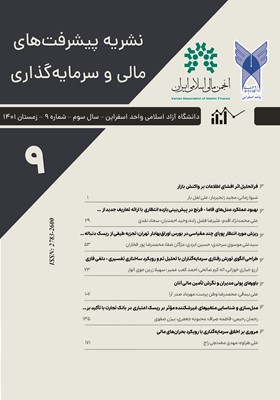باورهای پولی مدیران و نگرش تأمین مالی آنان
محورهای موضوعی : مدیریت مالی بنگاههای اقتصادیعلی بیدقی 1 , محمدرضا وطن پرست 2 * , مهرداد صدر آرا 3
1 - گروه حسابداری، واحد رشت، دانشگاه آزاد اسلامی، رشت، ایران.
2 - گروه حسابداری، واحد رشت، دانشگاه آزاد اسلامی، رشت، ایران.
3 - گروه حسابداری، دانشگاه گیلان، رشت، ایران.
کلید واژه: سود انباشته, انتشار سهام, استقراض, باورهای پولی,
چکیده مقاله :
هدف: مطابق مطالعات رفتاری، نوع نگرش مدیران شرکتها در تصمیمگیری آنها اثرگذار است. هدف این پژوهش، مطالعه رابطه باورهای پولی مدیران با نگرش تأمین مالی (درونسازمانی و برونسازمانی) آنان است.روششناسی پژوهش: در این پژوهش، جمعآوری دادهها از طریق پرسشنامه و با روش نمونهگیری در دسترس صورت گرفته است. جامعه موردمطالعه مدیران عامل یا مالی شرکتهای پذیرفتهشده در بورس اوراق بهادار تهران در سال 1400 است. حجم نمونه پژوهش با استفاده از جدول مورگان 183 نفر تعیین شد و در نهایت 159 پاسخنامه قابلاستفاده جمعآوری شد.یافتهها: نتایج، رابطه معناداری بین باور اجتناب از پول با هیچیک از نگرشهای تأمین مالی ارائه نکرد. بهعلاوه، باور هوشیاری نسبت به پول با تمایل به تأمین مالی از طریق سود انباشته، انتشار سهام و استقراض دارای رابطه مثبت است. باور منزلت دهندگی پول با تمایل به تأمین مالی برونسازمانی (استقراض و سهام) دارای رابطه مثبت است. باور پرستش پول نیز با نگرش تأمین مالی از طریق سود انباشته و انتشار سهام دارای رابطه مثبت است.اصالت / ارزشافزوده علمی: باتوجهبه اینکه باورهای پولی مدیران میتواند بر رفتار آنان مؤثر باشد و این موضوع چندان هم موردتوجه تحقیقات پیشین نبوده است، نتایج این پژوهش میتواند در بهبود تصمیمگیریها مؤثر بوده و ادبیات حوزه تأمین مالی را گسترش دهد. شرکتها میتوانند در کنار سایر مؤلفهها باورهای پولی مدیران را نیز موردتوجه قرار دهند تا از طریق پیشبینی سیاستهای تأمین مالی آنان و درنظرگرفتن سیاستهای توسعهای شرکت تعارض منافع بین سهامداران و مدیران را کاهش دهند.
Purpose: According to behavioral studies, the decision-making and behavior of company managers are among the factors affecting the type of their attitude toward various issues. This study aims to study the relationship between managers' money beliefs to their financing tendencies (internal or external).Methodology: In this study, data were collected through a questionnaire and the convenient sampling method. The study population is CEOs or financial managers of companies listed on the Tehran Stock Exchange in 2021. The study sample size (n = 183) was determined using the Morgan table, and 159 usable answer sheets were received.Findings: The results of the statistical analysis of data did not show a significant relationship between money avoidance beliefs and financing attitudes. In addition, the money vigilance belief had a positive relationship with the tendency to finance through retained earnings, stock issuance, and borrowing. Money status belief had a positive association with the external financing attitude (borrowing and stock). The money worship belief was positively related to the financing attitude through retained earnings and the issuance of shares.Originality / Value: Since managers' money beliefs can affect their behavior, this issue has not been the focus of previous research. The results of this research can be effective in improving decision-making. Also, the results of this research expand the literature in the field of financing. Companies can pay attention to the money beliefs of managers to reduce the conflict of interests between shareholders and managers by predicting their financing policies and considering the company's development policies.
Ajzen, I. (1985). From Intentions to Actions: a Theory of Planned Behavior. Action Control, 11–39.
Lawson, D; Klontz, B. T; Britt, S. L. (2014). Money Scripts. Financial Therapy, 23–34.
_||_

